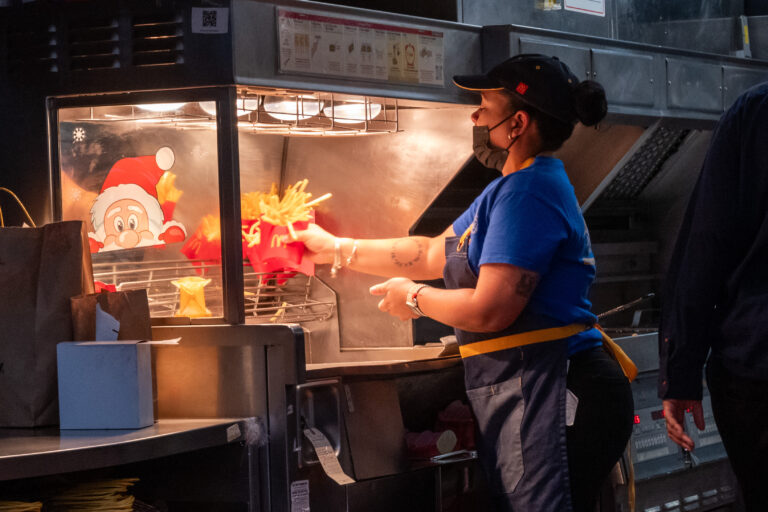The debate surrounding the cost of living and wages in the United States has once again come into the spotlight.
Discussions on the matter have been spanning across news outlets, social media platforms, and even podcasts.
Recently, Fox News host Jesse Watters stirred controversy during an appearance on the PBD podcast with Patrick Bet-David while promoting his new book.
Watters sparked outrage online with his comments regarding the wages of fast-food workers.

Credit: Roy Rochlin / Getty.
Jesse Watters’ insensitive comment
One particular statement of his raised eyebrows, when he said: “If you’re making $20 an hour to work in a fast-food restaurant, is that six figures?”
This remark left many questioning Watters’ grasp of basic arithmetic and his connection to the realities faced by hourly wage earners.
“You’re very good at math, so see if you can do this in your head. You probably can. If you’re making $20 an hour to work at a fast food restaurant, alright,” Watters stated, “Is that six figures? Are you making six figures?”
At which point, Bet-David said: “No, no, $40,000 a year.”
However, Watters continued, adding: “So, if your husband or wife is also there, you’re making $100,000 as a family. Both working at McDonald’s.”
He continued: “OK, that’s crazy. That is crazy. Because that job really doesn’t require much. So, it’s inflating the entire, you know, labor sector and the Happy Meal.”
Fox News' Jesse Watters: "If you're making $20 an hour to work at a fast-food restaurant … Is that six figures?" pic.twitter.com/qe59BWA6je
— The Recount (@therecount) April 11, 2024
Netizens watching the video were fuming, with one person calling Watters a “waste of skin” for his comments on fast-food workers.
Another person chimed in with: “He couldn’t make his point with one person working at McDonald’s, earning an inadequate $40K a year, so he had to change it to a two income family.”
Someone else wrote: “His job doesn’t require much and he gets paid a crazy amount. So he would know.”
Fast-food industry wages
The conversation between Watters and Patrick Bet-David on the podcast shed light on the discrepancy in wages within the fast-food industry. While Watters suggested that $20 an hour was the norm, the reality is far from that – with wages for fast-food workers ranging from $12 to $20 per hour. Of course, these wages are dependent on factors such as location, experience, and job position.
In a move to address wage disparities, California implemented a minimum wage law on April 1st of this year, setting the minimum salary for fast-food workers at $20 an hour, CNN reported.
The co-chair of the Labor Center at the University of California, Berkeley, Ken Jacobs, told ABC News in a recent interview that this wage increase is now the new benchmark. “We went through the Fight for $15 and now $20 is out there as a new target wage,” he said.
This long-awaited legislation has been hailed as a significant step towards ensuring fair compensation for workers in the fast-food sector. However, concerns have been raised about the potential repercussions of this law on non-fast-food franchise owners, who fear workforce shortages and operational challenges.

Credit: Spencer Platt / Getty.
Critics have also taken aim at Watters’ suggestion that working in fast-food chains “really doesn’t require much,” and that, according to him, “It’s inflating the labor sector.”
These comments are reflective of a broader societal stigma surrounding fast-food work, overlooking the physical demands and challenging conditions that employees in places like McDonald’s face on a daily basis.
Working in a fast-food restaurant entails more than just taking orders and serving food. It requires stamina, multitasking abilities, and the patience to deal with demanding customers. Despite the challenges, fast-food workers often find themselves on the receiving end of disrespect and ridicule, both in-person and online.
The COVID pandemic further highlighted the essential role played by fast-food workers, who continued to serve their communities amid unprecedented challenges. Yet, their contributions are often undervalued and overshadowed by stereotypes and misconceptions.
What do you think of Jesse Watters’ comments on fast-food workers? Let us know in the comments!